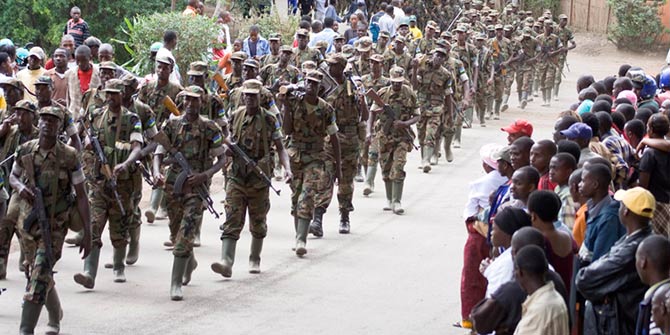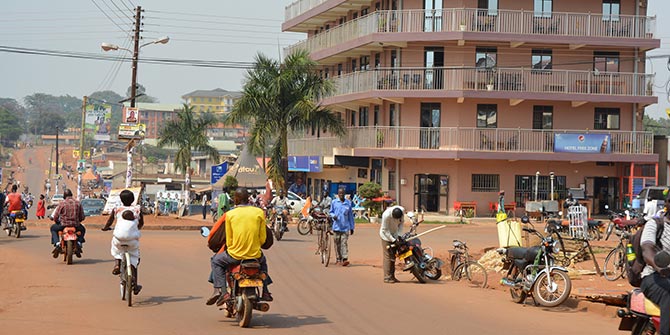Richard Moncrieff argues that this book is a reflection of the conditions of academic production concerning the African Union. The eagerness to offer prescription rather than push the analysis further and the absence of consideration of realities on the ground in African countries both reflect a world dominated by consultancy and multiple hatting, he says.
How should we evaluate the African Union (AU) over fifteen years after its creation? Has it failed to live up to its promise? The pessimists would point to the distance between its aims such as silencing the guns and the meagre results obtained; to its reliance on outside funding and to the weakness of its core institutions. Others argue that the AU is still a work in progress; that critics should be more patient; that achievements have been made, in peacekeeping especially; that with just a bit more reform, some more enlightened leadership, and a bit more institution building, it could fulfil its early promise.
This twelve chapter multi-authored was edited by Tony Karbo of the Centre for Conflict Resolution in Cape Town and Tim Murithi from the University of Free State, but despite some diversity of  views, adheres in large part to the second position. In an ultimately uncomfortable mixture of activism and analysis, the African Union is presented as always one more reform away from its ideals. A strong emphasis on treaties signed in the founding years of the early 2000s allows the process to be mistaken for progress while shortcomings are described as the AU not yet achieving its goals.
views, adheres in large part to the second position. In an ultimately uncomfortable mixture of activism and analysis, the African Union is presented as always one more reform away from its ideals. A strong emphasis on treaties signed in the founding years of the early 2000s allows the process to be mistaken for progress while shortcomings are described as the AU not yet achieving its goals.
This teleological approach permeates the book; chapter one by Kuruvilla Mathews starts by paraphrasing the AU’s own self-description as “representing the revival and re-emergence of Pan-Africanism under the general rubric of an African Renaissance with a vision for an integrated, prosperous and peaceful Africa that will be a dynamic force in the global arena”. Far from providing any critical analysis of such ambition, the chapter goes on to breezily urge that “the advantages of continental integration and unity can hardly be over-emphasised. If Africa gives itself a central government there will be no further need for individual countries to maintain expensive separate armies”.
The vertiginous distance between such ambition and the reality on the ground is perhaps embedded in the African Union project itself, and in the international willingness to believe in, and fund, “African solutions to African problems”. An interesting chapter by Molefi Kete Asante looks at the roots of the AU in international pan-African ideals. But this doctrinal anchor in the aspirations of the unity of African people obscures the AU’s curious founding ambition; that a new international institution could intervene in governance issues of member states to prevent conflict and improve democracy. The European Union’s current difficulties in Eastern Europe bear adequate witness to the ambition of such an undertaking. The problems the AU faces in achieving its stated aims are therefore concrete and persistent, and not liable to be solved through one further reform package.
In taking the African Union project largely on its own terms, this volume allows no space for a third interpretation: that the limitations of the AU are not just a deficiency, but also a strategy, and its very failings may suit powerful interests, international and, more importantly, African. Unfortunately, with a couple of notable exceptions and some brief lamentations of weak leadership and bad governance, the book fails to address the political forces shaping not just integration but non-integration on the African continent.
Despite this, the book has some notable strengths and high points. The richness of detail, especially concerning the decade of the 2000s is very useful: Chris Landsberg’s chapter on South Africa and the AU is a case in point. The chapter by Adonia Ayebare, who works with the African Union’s representation to the UN in New York, is a highly informative and surprisingly frank discussion of the achievements and limitations of African cooperation in the General Assembly and in the Security Council. We learn how nominations for senior positions are dealt with, how Morocco’s non-membership of the AU makes aligning AU and African positions harder, about relations between the Africa group and other groups such as the G77, and about cooperation, but also tensions, with the Security Council.
In Chapter 9, Dawn Nagar and Fritz Nganje offer a highly illuminating account of relations between Regional Economic Communities (RECs) and the AU, including on rarely analysed legal aspects. This chapter includes the best passage of the book, where its authors break from the monotony of institutional analysis to explain the real reasons for the AU’s shortcomings: “intergovernmental organisations such as the AU and the different RECs should be seen primarily as vehicles through which states seek to promote their interests” which makes complementarity between the AU and RECs hard to establish as “states will prioritise the authority of either the AU or a REC not out of a careful assessment of the conflict dynamics and the capabilities of that organisation, but mostly on the basis of which organisation affords them enough space to legitimise their preferred approach”.
In chapter 5 former senior AU official Hesphina Rukato provides a list of AU commission competencies. But she then cleverly uses this to point to real structural problems of over-tasking, politicised recruitment and so forth. She concludes that “the AU assembly cannot ask the Commission to do what member states do not or fail to do at the national level” (p. 125).

However, these strong chapters are overshadowed by the book’s consistent mistaking of aspiration for reality, or for real possibility. Theory is constantly mistaken for reality and advances on paper are overblown: we learn on page 98 that the fourth pillar of the AU’s Post Conflict Reconstruction and Development Policy is humanitarian assistance, without being informed that the AU practically never intervenes in this field. On page 104 we learn that “the OAU’s policy of non-interference in internal affairs of member states has been replaced by the new principle of non-indifference to human rights abuses” (my emphasis). The book is often optimistic to a fault: on page 79 we are told that impunity is now scorned upon, that constitutionalism is now the norm, and “although corruption is still rife, efforts are underway to curb this political cancer”.
In Chapter 7’s overview of the African Peace and Security Architecture asserts that the ASF “provided the most hope for the provision of continental collective security, given its ability to provide the AU with a continental rapid deployment capability” (p. 166). Whatever we may think of the ASF’s potential, it is surely a stretch to talk about its “ability” in such uncritical terms. We learn 2 pages later that the ASF was “operationalised” in 2016, but given little idea what this might mean in reality or in relation to continental power politics. Indeed any real consideration of African power politics is largely absent, despite the promise of the book’s title.
My purpose in highlighting such flights of fancy is in no way to deny the progress that has been made on the continent or by the AU or to replay the tired tropes of Afro-pessimism, but to point out to the need for far greater analytic care.
The weakness of the book is reflected in the editing. Analytic threads are left hanging: Kasaija Philip Apuuli in chapter 7 takes nearly half a page to list the criteria for selecting countries to sit on the African Union Peace and Security Council (PSC), including contribution to the maintenance of peace and security and respect for constitutional governance. But nowhere in the chapter are we told whether these criteria are actually respected in the selection of PSC members. Facts are barely checked if they suit the flow of ideas. Hence Africa has “not been able to increase its economic growth rate” (p. 184 a strange assertion by any reckoning) Burundi is suffering a “massive forced displacement of Burundians within the country” (p. 102: not true, displaced Burundians have mainly gone to neighbouring countries); South Africa, Zimbabwe and Namibia were members of the non-aligned movement before the end of Apartheid, and an Africa group was created at the UN in 1954 (both p. 286). We are told that Brexit is a “democratic reversal” (p. 103), and that “development in Africa will not begin until the struggle over development paradigms, strategies and agendas is over”. These and other glib assertions remain unchallenged and unexamined. As several chapters end with a prescription for fixing problems which have been only vaguely identified, the weakness of style becomes even more apparent: “a good starting point” we are told on p. 186 would be to “identify problems and enact and implement agreed rules and processes”.
But the faults of this book are not simply a product of editorial weakness, I would argue that they are ultimately a reflection of the conditions of academic production concerning the African Union. The eagerness to offer prescription rather than push the analysis further and the absence of consideration of realities on the ground in African countries both reflect a world dominated by consultancy and multiple hatting. One result is that institutions that have almost no traction outside the Addis bubble are given far too much emphasis, especially the African Peer Review Mechanism which, we are told in chapter 6, co-written by a former APRM official “has had discernible and sizeable dividends in governance and socio-economic development” (p. 141) and despite a few problems is “forging ahead” (p. 142).
There is nothing inherently wrong of course in the political engagement of academics, nor in officials or former officials writing in such volumes; the best chapters of this book are written by insiders or former insiders. But such fluidity of fields needs to be matched by adequate academic rigour and must avoid becoming a barely critical reflection of the stated aspirations of an institution.
The African Union : Autocracy, Diplomacy and Peace-building in Africa by Tony Karbo and Tim Murithi. Edited IB Tuarus, London, 2018
Richard Moncrieff is the central Africa Director for International Crisis Group and write here in a personal capacity.
The views expressed in this post are those of the author and in no way reflect those of the Africa at LSE blog or the London School of Economics and Political Science.





